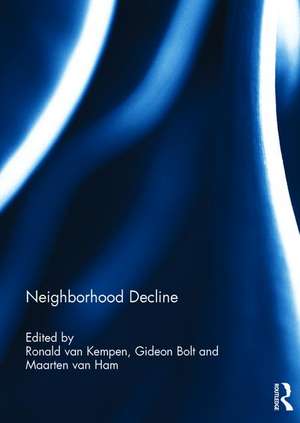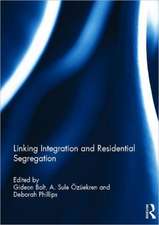Neighborhood Decline
Editat de Ronald van Kempen, Gideon Bolt, Maarten van Hamen Limba Engleză Hardback – 11 iul 2017
| Toate formatele și edițiile | Preț | Express |
|---|---|---|
| Paperback (1) | 269.70 lei 6-8 săpt. | |
| Taylor & Francis – 7 feb 2019 | 269.70 lei 6-8 săpt. | |
| Hardback (1) | 698.17 lei 6-8 săpt. | |
| Taylor & Francis – 11 iul 2017 | 698.17 lei 6-8 săpt. |
Preț: 698.17 lei
Preț vechi: 821.37 lei
-15% Nou
Puncte Express: 1047
Preț estimativ în valută:
133.61€ • 138.64$ • 111.67£
133.61€ • 138.64$ • 111.67£
Carte tipărită la comandă
Livrare economică 15-29 martie
Preluare comenzi: 021 569.72.76
Specificații
ISBN-13: 9781138744707
ISBN-10: 1138744700
Pagini: 146
Dimensiuni: 174 x 246 mm
Greutate: 0.45 kg
Ediția:1
Editura: Taylor & Francis
Colecția Routledge
Locul publicării:Oxford, United Kingdom
ISBN-10: 1138744700
Pagini: 146
Dimensiuni: 174 x 246 mm
Greutate: 0.45 kg
Ediția:1
Editura: Taylor & Francis
Colecția Routledge
Locul publicării:Oxford, United Kingdom
Public țintă
Postgraduate and UndergraduateCuprins
1. Neighborhood decline and the economic crisis: an introduction 2. The global financial crisis and neighborhood decline 3. Reclaiming neighborhood from the inside out: regionalism, globalization, and critical community development 4. The US Great Recession: exploring its association with Black neighborhood rise, decline and recovery 5. Neighborhood change beyond clear storylines: what can assemblage and complexity theories contribute to understandings of seemingly paradoxical neighborhood development? 6. Economic decline and residential segregation: a Swedish study with focus on Malmö 7. Are neighbourhoods dynamic or are they slothful? The limited prevalence and extent of change in neighbourhood socio-economic status, and its implications for regeneration policy 8. Race, class, unemployment, and housing vacancies in Detroit: an empirical analysis
Descriere
The global financial and economic crisis that hit the world since 2008 has affected the lives of many people all over the world and resulted in declining incomes, rising unemployment, foreclosures, forced residential moves, and cut-backs in government expenditure. The authors of this this book show that the economic crisis has affected poor neighborhoods more severely than more affluent ones. The tendency of the state to retreat from these neighborhoods has negative consequences for their residents and may even nullify the investments that have been made in many poor neighborhoods in the recent past. This book was originally published as a special issue of Urban Geography.


























